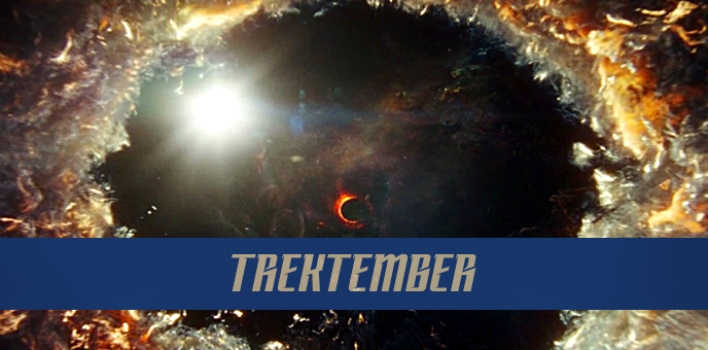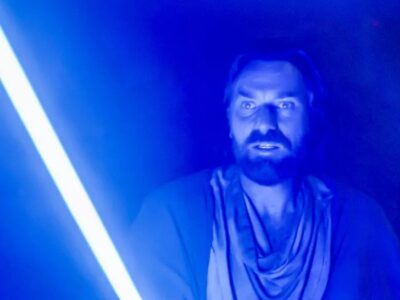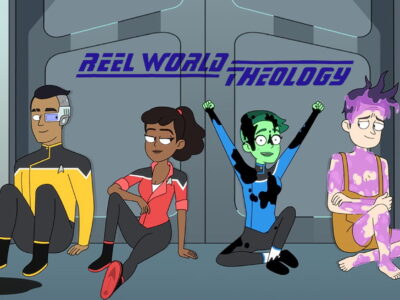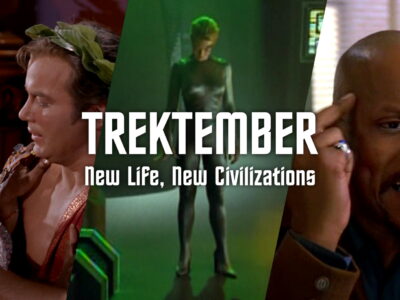Trektember: The Vulcan Hello | Star Trek: Discovery
What struck me most as I watched the debut episode of Star Trek: Discovery was its use of the eye as a recurring visual motif, and vision as a dominant theme.
It begins, a la the 1997 science fiction film Contact, with an extended pull-back from a cosmic starscape revealed to be reflected (or somehow contained) in a person’s eye—in this case, the eye of T’Kuvma, the would-be messianic unifier of the Klingon Empire. It continues as Captain Georgiou “sets a star” for her crew aboard Shenzhou to notice so that they can find her and Commander Burnham on the windswept, desert surface of a strange new world.
In short order, the camera offers us two close-ups of Burnham’s eye. The first comes as she is rocketing her way to get a close-up look at the alien artifact obscured by a debris field (notably, Georgiou could not see the object, which turns out to be the Klingons’ sacred beacon, by peering through her telescope). The second occurs as Burnham awakes from unconsciousness in the Shenzhou‘s sickbay following her battle with Rejac, the Klingon torchbearer.
When the action shifts back to the Klingons, we watch T’Kuvma anoint Voq as new torchbearer and heir apparent. “I see myself in you,” T’Kuvma says (emphasis mine—perhaps T’Kuvma’s, too; I don’t speak Klingon). He tells the albino Klingon that Voq acts as a mirror for him (thus sounding another of the first season’s major themes).
And the episode ends with the aftermath of the beacon’s illumination, a light so bright the Shenzhou‘s optical filters are overwhelmed, and so conspicuous that Sarek tells Burnham, “The quadrant reports a new star in the sky.” (Given that it takes light from Sol’s nearest stellar neighbor, Alpha Centauri, four years to reach Earth’s skies, we can only assume Sarek is wryly repeating others’ poetic reactions.)
A Closer Look
Watching “The Vulcan Hello” feels like watching a Star Trek movie more than it feels like watching any episode of any of the other series in the franchise. The first-rate special effects are one reason. The frequently intricate camera movements are another. (I adore the visual shout-out to “The Cage” after the opening credits, when the camera pushes in on and then through the exterior of the Shenzhou‘s bridge). But above all, it’s the creative team’s deliberate, repeated focus on the eye that makes this episode seem cinematic. I can’t recall any previous Star Trek episode making such a self-consciously artistic choice.
Any English major worth her or his salt will tell you that repeated images in a work of art bear close attention. When authors, or directors and cinematographers, go out of their way to confront you with the same or similar images time after time, you can be sure those images hold a key to interpreting the whole work. So what does the image of the eye tell us about “The Vulcan Hello”?
As I see it (pun intended), most of this episode’s ultimately disastrous action is sparked by failures of vision—not the literal sense of sight, but our faculty to perceive truth and envision what isn’t but what could be.
A Failure of Vision
T’Kuvma looks at the Klingon Empire and sees a broken, fragmented society at risk from outsiders who encroach on its territory and do not share its values. Is his perception accurate? We do not know. No other Klingon in the episode voices a dissenting opinion (although one makes a faltering attempt). Simply because T’Kuvma says the Empire is in need of saving does not necessarily make it so. Instead of seeing whatever new possibilities may exist for his people to move forward in their current situation, T’Kuvma can only look backward to the golden age of Kahless and launch what will prove to be a costly war in an ultimately futile attempt to recapture the past. His own comments to Voq—that Voq is an outsider yearning to feel a part of something larger than himself, just as he is—suggest T’Kuvma’s crusade is as much as or even more about his own issues than it is about the good of the Empire.
If we accept what Star Trek has always told us about Starfleet and the United Federation of Planets as normative, then T’Kuvma and the Klingons don’t need to be afraid. Starfleet does “come in peace.” At its best, it is not about imposing cultural hegemony on the galaxy (Quark’s comparison of the Federation to root beer on Star Trek: Deep Space Nine notwithstanding). Its mission is, as Burnham reminds Saru, to discover what is new for the sake of the discovery.
But Michael Burnham’s failure of vision in “The Vulcan Hello” sparks mutiny and war—a renewed era of conflict her adoptive brother Spock will, in Star Trek VI: The Undiscovered Country, describe as “almost seventy years of unremitting hostility.” Because Burnham is understandably haunted by her visions of the Klingon terrorist attack on Doctari Alpha that left her an orphan (we share her visions when we see her as a child in the Vulcan education center), she is unable to see the Klingons at the beacon in the binary star system as anything but an immediate and existential threat to Starfleet, to her captain, and to herself. She can only look backward to the past by asking Sarek how the Vulcans handled their early encounters with the Klingons, rather than looking for new possibilities—or, for that matter, even to Starfleet’s established posture, the guiding “star” that Georgiou “sets”: “Starfleet doesn’t shoot first.” Burnham’s mutiny is assuredly as much as or even more about her own issues than it is about the good of the Federation.
Seeing and Sinning
Jesus warned us that our eyes could cause us to sin (Matthew 5:29). And while he was speaking (in the immediate context) of adultery, our eyes can lead us astray in other ways. As fallen and sinful, we are “foolish and senseless people, who have eyes, but do not see, who have ears, but do not hear” (Jeremiah 5:21, NRSV; cf. Mark 8:18). We accept too readily our limited and flawed perceptions of the world and of our neighbors in it.
We forget only God’s perspective is perfect, and that God calls and graciously empowers us to follow the star God sets instead of lesser lights that end up leading us only into darkness. God invites us, in Christ, to see ourselves and others from a heavenly point of view. Michael Burnham’s words to the Shenzhou during her spacewalk are an echo of God’s words to us: “I wish you could see what I am seeing. It is sublime.”
• • •
Trektember is an annual series about Star Trek; this year, we’re examining the first seasons of Star Trek: Discovery and The Orville. For more information on this series, click here; or, to read every article from the beginning, click here!









Pingback: Trektember: Command Performance | The Orville | Reel World Theology
Pingback: Trektember: Season 3 Episode List | Reel World Theology
Pingback: Trektember: What’s Past is Prologue | Star Trek: Discovery | Reel World Theology
Pingback: Trektember: Will You Take My Hand? | Star Trek: Discovery | Reel World Theology